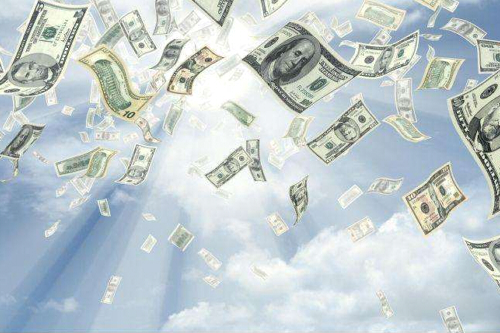Schumpeter: Money Mountains
熊彼特:金山
Is there any rational justification for tech firms’ huge cash piles?
科技公司现金成堆,有合理的解释吗?
Take a moment to admire – and fear – the ascent of America’s big-five tech firms. Apple, Alphabet, Microsoft, Amazon and Facebook have recently become the five most valuable listed companies in the world, in that order. With a total market value of $2.9trn, they are worth more than any five firms in history.
我们来花一点时间,对美国五大科技公司的快速成长表示一下赞赏——还有担忧。苹果、Alphabet、微软、亚马逊和Facebook近期成了世界上最有价值的五大上市公司,座次如上。它们的总市值高达2.9万亿美元,比历史上任何五家公司的总价值都高。
Elevated tech valuations used to be a sign of hysteria. Today’s investors believe they are making an ice-cold judgment that these firms are the dominant oligopolies of the 21st century and will extract a vast, rising, flow of profits. There is one gnawing doubt, however: the formidable five’s cash-rich balance-sheets, which are built as if they expect a crisis, not to dominate the world.
科技公司估值高曾经是市场不理性的征兆,而如今投资者认为自己做出了绝对客观的判断,相信这五大公司是主导21世纪的寡头企业,将获得不断增长的巨额利润。然而,有一件事让人心存不安:这五强的资产负债表上现金充裕,不像是要统治世界的架势,倒像是要为应对危机做准备。
It is easy to see why investors are keen. Billions of users are tied into these firms’ social-media networks, digital assistants, operating systems and cloud-computing platforms. The five firms are squeezing traditional competitors such as IBM and Macy’s. Together they make $100bn of profits. Analysts forecast this will rise to $170bn by 2020. The rebels of Silicon Valley have evolved into slick moneymaking machines with high market shares. For investors it just doesn’t get any better.
投资者热衷五强,原因显而易见。全球数十亿用户都与这些公司的社交媒体网络、数字助理、操作系统以及云计算平台捆绑在一起。五强正在挤压IBM和梅西百货这类传统型竞争对手。这五家公司的利润总计高达1000亿美元,分析师预计到2020年将上升至1700亿美元。硅谷的反叛分子已经进化成了具有高市场份额的高明赚钱机器。对投资者而言,这再好不过了。
Old-economy oligopolists, such as cable, telecoms and beer companies, are confident about their ability to extract reliable rents from customers, so they finance themselves largely with debt, which is cheap but inflexible, and return most of the cash they make to shareholders. Yet, oddly, the biggest tech firms have the opposite approach. Together they have $330bn of net cash (cash less debt), a ratio of twice their gross cashflow.
电视、电信和啤酒这类传统经济模式下的寡头垄断企业信心满满,自认有能力从客户那里赚取可靠的收入。因此,它们主要通过债务为自己融资,成本低但不灵活,再把赚到的大部分现金返还给股东。然而奇怪的是,五强科技公司做法却恰恰相反,它们共有3300亿美元的净现金,是它们总现金流的两倍。
The pile far exceeds the cash buffers that tech and pharmaceutical firms traditionally carry to compensate for their lack of physical assets that debt can be secured against. For example a selection of five cash hoarders from an early generation of tech giants – Cisco, Intel, Oracle, Qualcomm and Texas Instruments – together have had an average ratio of only 1.3 times since 1996.
科技和制药公司向来都会保留一些缓冲现金,以弥补举债时可抵押实体资产不足的情况,但五强的现金量远远超过一般水平。从早一代科技巨头中五家偏爱囤积现金的公司来看,1996年以来,思科、英特尔、甲骨文、高通和德州仪器这五家公司的净现金平均仅为其现金流的1.3倍。

The money mountain will get much bigger as profits soar. The five firms have policies for returning some cash to shareholders. For example, Alphabet and Facebook will not pay dividends for the “foreseeable future” but have small buy-back programmes, albeit with no deadlines. Apple pays a meaty dividend and has a budget for repurchasing shares until 2019. Factoring in these programmes, and analysts’ profit forecasts, their total net cash will reach $680bn by 2020, or three times gross cashflow. Even Amazon, which has a relatively small pile now, will reach $50bn.
随着利润飙升,五强企业的金山还会变得更大。它们有向股东返还部分现金的政策,例如,Alphabet和Facebook在“可预见的未来” 虽不会分红,但有小规模的回购计划,尽管没有设定期限。苹果分红丰厚,还有在2019年前回购股份的预算。考虑到这些政策和分析师的利润预测,到2020年,五强净现金总额将达到6800亿美元,相当于总现金流的三倍。即使是目前现金相对较少的亚马逊,净现金额也将达到500亿美元。
The cash cushion is far larger than is needed to absorb shocks, such as a financial crash or a hacking attack. Schumpeter has devised a tech “stress test”. It assumes that staff are paid in cash not shares, which might happen after a stockmarket collapse, and that firms pay all their contingent tax liabilities (including all repatriation levies) as well as regulatory and litigation claims. It also includes a year of contractual payments – for instance Apple has to pay $29bn to component suppliers. Including all of these costs, the five firms would still have $380bn of net cash by 2020.
五强的现金储备远远超出应付金融危机或黑客攻击这类突发事件所需。熊彼特设计了一个科技公司“压力测试”。测试假定员工薪酬以现金而非股票支付(这种情况在股市崩溃之后可能发生),且公司会付清所有可能发生的税目(包括资金汇回本国缴纳的税款)以及监管和诉讼费用。测试还包含了一年的合同付款,例如苹果必须向零配件供应商支付290亿美元。把所有这些费用都算上,五强到2020年仍将拥有3800亿美元的净现金。
Nor could fresh investments soak up all the cash. The five tech firms together put $100bn last year into research and development and capital spending, three times more than half a decade ago. A torrent of money is already flowing into data centres, software, new headquarters and “moon shots” such as driverless cars and immortality drugs. In order for the firms to spend all of the cashflow they are on track to retain, annual investment would need to rise to almost $300bn by 2020.
新投资也不会用尽所有现金。五强公司去年共投入1000亿美元用于研发和资本支出,比五年前多三倍。已经有大笔资金流入数据中心、软件、新总部,以及无人驾驶汽车和长生不老药这类“探月”项目。以目前的收入状况,如果公司要花光所有留存的现金,2020年之前年投资额将需要达到近3000亿美元。
That is over twice what the global venture-capital industry spends each year. It is 51 times the annual cash burned up by Netflix, Uber and Tesla, three firms famous for being cash hungry. And it is 37 times the average annual amount of cash the five firms have in total spent on acquisitions to gain new technologies and products, such as Facebook’s $19bn purchase of WhatsApp, a messaging service in 2014, or Google’s $3.1bn acquisition of DoubleClick, an advertising firm, in 2007.
这是全球风投行业每年投资额的两倍还多,是Netflix、优步和特斯拉这三家出了名缺钱的公司每年所烧掉现金的51倍,同时也是这五强为获得新技术和新产品平均每年在收购方面支出的37倍,比如Facebook在2014年以190亿美元收购了通讯应用WhatsApp,谷歌于2007年以31亿美元收购了广告公司DoubleClick。
Might these firms hoard cash just because they are run by megalomaniacs who are too rich and odd to obey any rules? That seems glib and out of date. Apple and Microsoft are no longer controlled by their founders. Those behind Alphabet were pragmatic enough in 2015 to appoint Ruth Porat, the former finance boss of Morgan Stanley, as its chief financial officer, to instil more discipline. Jeff Bezos’s interest is arguably for Amazon to pay a dividend – in the absence of one he is selling $1bn of his shares every year to raise cash to finance his space-rocket firm.
这些公司囤积大量现金,会不会只是因为它们的管理者都是些超级有钱又脾气古怪、不屑遵守任何规则的自大狂?这样的想法似乎太过肤浅,而且也过时了。苹果和微软已不再由创始人控制,Alphabet的掌管者也都非常务实:在2015年任命摩根士丹利前财务负责人露丝· 波拉特(Ruth Porat)为首席财务官,以加强财务纪律。杰夫·贝佐斯可以说是想让亚马逊分红的——在没有分红的情况下,他每年出售自己10亿美元的股票来募集资金,资助他的太空火箭公司。
下载:英文、中文版本








